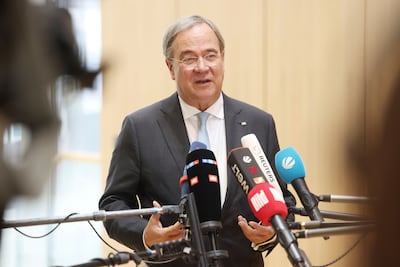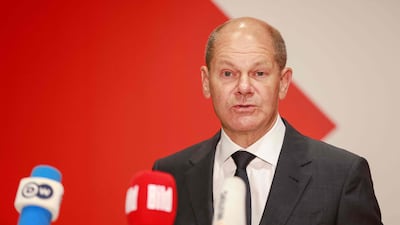German election winner Olaf Scholz moved a step closer to the chancellorship on Wednesday as two smaller parties agreed to start coalition talks with his Social Democrats (SPD).
The move by the Greens and Free Democrats (FDP), who emerged as kingmakers at the election, deals a blow to Armin Laschet’s conservatives who came second at the polls but still hoped to build a majority.
It paves the way for three-way negotiations between the SPD, the Greens and the FDP to begin on Thursday – although these could last for months as parties haggle over climate change and other issues.
If they agree on a deal, they will form the first ever “traffic light” coalition at national level, so-called because of the colours of the three parties. Mr Scholz has made it clear that this is his preferred choice.
Mr Scholz and Mr Laschet had both courted the Greens and the pro-business FDP, who held preliminary talks among themselves before approaching the larger parties.
Although hardly natural allies on economic policy, the Greens and FDP both campaigned for change and modernisation, and had strong support from younger voters.
“We have proposed to the FDP that we should jointly approach the SPD … and begin three-way discussions,” said Green co-leader Robert Habeck.
“The discussions over the past week have shown there is the greatest common ground here. That’s especially true in the broad area of social policy.”
Mr Scholz welcomed the step forward in post-election talks. "The citizens gave us a mandate to form a government together," he said. "It's now up to us to implement that."
Shortly after the Greens made their announcement, FDP leader Christian Lindner confirmed he would take up their suggestion to approach Mr Scholz.
Both parties said they were not ruling out future talks with the Union, Mr Laschet’s centre-right bloc, but there will not be any parallel discussions. In a brief statement, Mr Laschet said he respected their decision.
A three-way alliance led by Mr Laschet would have a majority in parliament, but he was politically weakened by losing the election and polls show that more Germans want Mr Scholz as chancellor.
Mr Laschet faces dissent in his own ranks for presiding over the centre-right’s worst result in postwar Germany. Outgoing Chancellor Angela Merkel had led the Union to four straight election victories.
“In policy terms we have the greatest overlap with the Union,” Mr Lindner said. “But their unity and willingness to govern is a matter of public debate.”
He said: “The FDP will only join a government of the centre that will strengthen the value of freedom and give a real impetus to the renewal of our country.”

Markus Soeder, the leader of Mr Laschet’s smaller Bavarian allies, said the centre-right bloc was still available for talks. But he said the two kingmakers should not use the threat of turning to the Union as a bargaining chip in their talks with the SPD.
“The traffic light is now clearly the first choice. We accept that,” he said. “The FDP and Greens have made their decision.
“After today, we have to face up to the reality that the Union will most probably not be part of the next government.”
Mrs Merkel will remain in office as a caretaker until a new coalition is formed. Mr Scholz has said he wants this done by Christmas.
Peter Altmaier, a CDU minister under Mrs Merkel, said the party needed to accept the message from voters after it crashed to its worst-ever result.
“The traffic-light train has left the station,” he said. “Now we have to do our own homework and show that we have learnt our lessons.”


